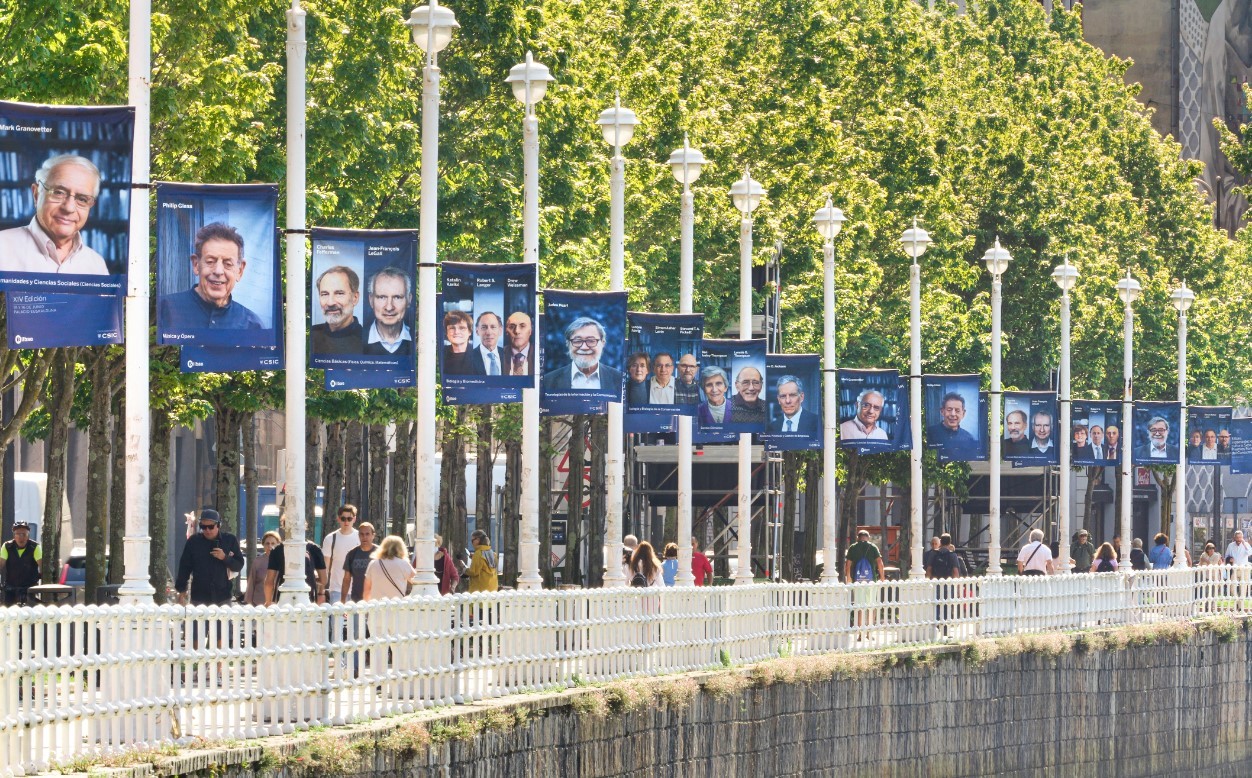
Bilbao again takes on the mantle of “knowledge capital” to celebrate the 14th edition of the Frontiers Awards
The presentation ceremony of the 14th Frontiers of Knowledge Awards will take place on Thursday, June 16 in the Euskalduna Conference Centre, Bilbao. The evening before, the same center will be the venue for the gala concert in honor of this year’s recipients of the BBVA Foundation’s international prizes, recognizing scientific and cultural excellence. This will be the third time that the Bizkaia capital has hosted the Frontiers Awards events, following the BBVA Foundation’s decision in 2019 to make Bilbao the permanent home of the ceremony, and the holding of a double ceremony for the 12th and 13th editions after the postponement of the previous year’s events for reasons of the pandemic. Once again, then, the city takes on the mantle of “knowledge capital,” its streets lined with posters announcing the arrival of “14 laureates with a shared goal: to improve people’s lives and conserve the planet through science and culture.” The awards ceremony will be streamed live from the BBVA Foundation’s homepage at 7.30 p.m. (Spanish peninsular time).
13 June, 2022
The Frontiers of Knowledge Awards, established in 2008, recognize and reward contributions of singular impact in science, art and the humanities, privileging those that significantly expand the frontiers of the known world, open up new fields, or emerge from the interaction of various disciplinary areas.
In their 14th edition, the award in Basic Sciences has gone to mathematicians Charles Fefferman and Jean-François Le Gall for opening new perspectives in mathematical analysis and probability theory.
In Biology and Biomedicine, the award is shared by Katalin Karikó, Robert Langer and Drew Weissman for devising the two technologies that have propelled forward messenger RNA therapeutics, enabling the development of COVID-19 vaccines and opening new avenues for the treatment of multiple diseases.
Judea Pearl has won the award in Information and Communication Technologies for laying the foundations of modern artificial intelligence, enabling computer systems to process uncertainty and relate causes to effects.
In the Ecology and Conservation Biology category, the award goes to ecologists Lenore Fahrig, Simon Levin and Steward Pickett for incorporating the spatial dimension into ecological science and applying it to the design of nature reserves and more sustainable cities.
The glaciologist couple Ellen Mosley-Thompson and Lonnie Thompson share the award in Climate Change for glacier ice studies that show our climate is warming at unprecedented speed.
The award in Economics, Finance and Management has gone to Matthew Jackson for pioneering work that illuminates the role of networks in economic and social life.
The award in Humanities and Social Sciences – a category alternating annually between the two domains, with this edition devoted to the Social Sciences – has gone to economist Mark Granovetter for revealing the importance of an extended network of “acquaintances” in economic and social life.
Finally, in Music and Opera this year’s winner is composer Philip Glass for forging a unique musical style that embraces cultural traditions from around the world while appealing to audiences of all generations.
About the BBVA Foundation Frontiers of Knowledge Awards
The goal of the BBVA Foundation Frontiers of Knowledge Awards is to celebrate and promote the value of knowledge as a public good without frontiers, the best instrument at our command to take on the great challenges and opportunities of our time. Their eight categories are congruent with the knowledge map of the 21st century, according a differential weight to areas of particular relevance and dynamism in recent decades such as the environment, information and communication technologies and biomedicine, alongside other areas like basic sciences, economics, social sciences, the humanities and the supremely creative realm of contemporary music and opera.
The international committees deciding the awards are formed by internationally reputed experts, who deliberate independently applying the indicators and metrics of excellence proper to the subject area. Nominations are received each year from many of the world’s most prestigious academic, research and artistic institutions.
The BBVA Foundation is aided in candidate evaluation in the eight award categories by the Spanish National Research Council (CSIC), the country’s premier public research organization. CSIC appoints evaluation support panels made up of leading experts in the corresponding disciplinary domain, who are charged with undertaking an initial assessment of candidates, and drawing up a reasoned shortlist for the consideration of the award committees. CSIC is also responsible for designating each committee’s chair and participates with the BBVA Foundation in the selection of its members, thus helping to ensure the objectivity and merit of the selection process.
Twenty Frontiers laureates have gone on to win the Nobel Prize
One external indicator of the excellence of the Frontiers of Knowledge Awards is that as many as 20 awardees have subsequently been distinguished with a Nobel Prize.
Nine Frontiers laureates have gone on to take the Nobel Prize in Economics: Lars Peter Hansen (2013), Jean Tirole (2014), Angus Deaton (2015), William Nordhaus (2018), Abhijit Banerjee and Esther Duflo (2019), Paul Milgrom and Robert Wilson (2020) and David Card (2021).
In the case of the Nobel Prize in Physiology or Medicine, four Frontiers awardees were later distinguished by the Swedish Academy: Shinya Yamanaka (2011), James P. Allison (2018), and David Julius and Ardem Patapoutian (2021).
The Nobel Prize in Physics has found its way to four earlier Frontiers laureates: Didier Queloz and Michel G. E. Mayor (2019), and Klaus Hasselman and Syukuru Manabe (2021).
And finally, three Frontiers awardees have gone on to win the Nobel Prize in Chemistry: Robert J. Lefkowitz in 2012, and Emmanuelle Charpentier and Jennifer Doudna in 2020.

